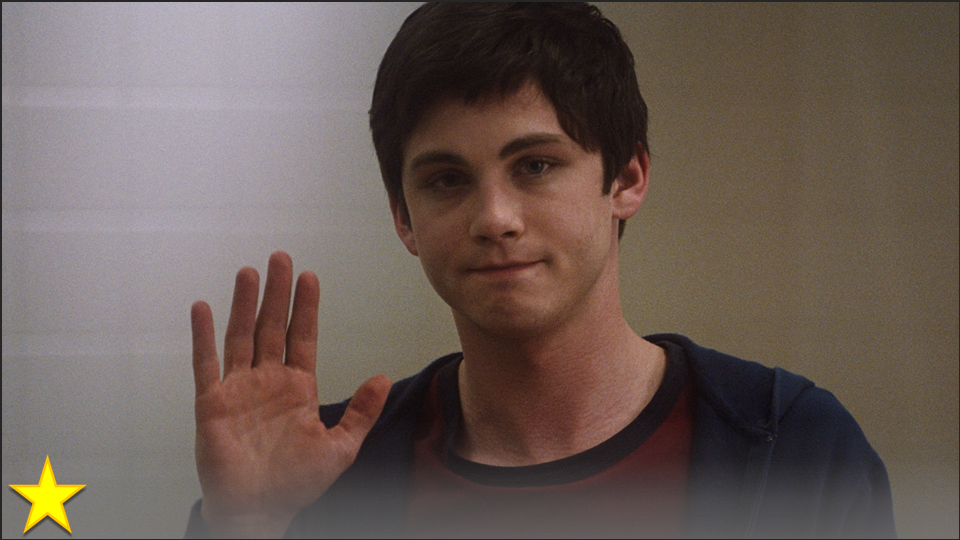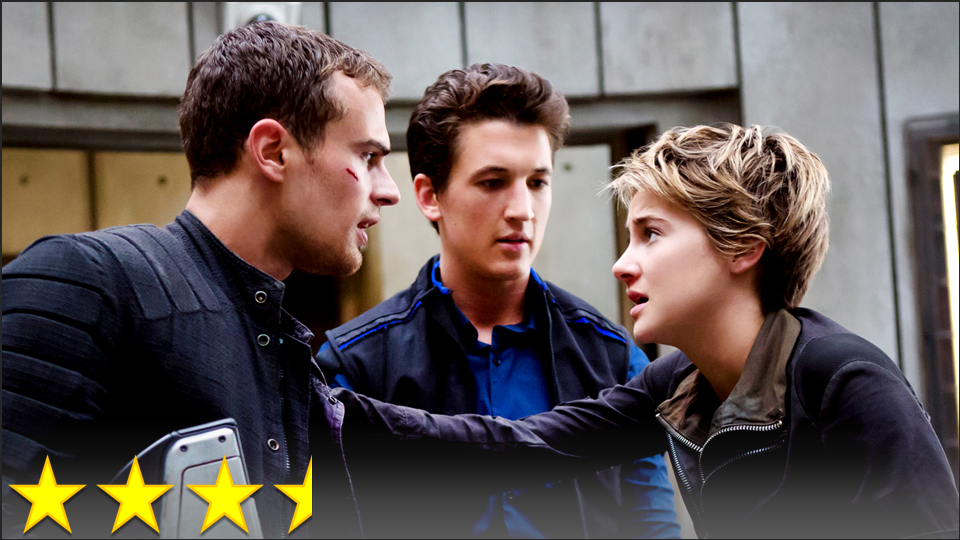Hi. I’m J. D. Hansel.
Not the usual J. D. Hansel though – that is to say, not the J. D. who’s already seen the movie that he’s trying to review, and has had time to form an opinion about it. I’m J. D. in the middle of watching the movie. I am one hour, six minutes, and 39 seconds into The Perks of Being a Wallflower, and at this time I cannot say with certainty that I’ll be able to finish the film, because the protagonist has just been dared to do the unthinkable. While I do not wish to give it away, I need to make one thing clear – this is my worst nightmare. This movie is terribly horrific because it’s filled with my biggest social fears. I don’t feel safe while watching this film.
I haven’t been this uncomfortable in ages. What started as a seemingly innocent comedy has had me sweating in a cold room, and biting my fist to keep from yelling. I had to stop the movie because I just couldn’t take it anymore. I’ve gone to do some chores, and I’ve gone for a walk, but PowerDVD is still sitting in my taskbar, eager to move on, and I still can’t muster up the courage to see what’s going to happen next. I even had to get the DVD case out of my sight, because just thinking about the film makes me shaky, queasy, and rather dehydrated. I’m trying to stall by getting other things done, so I’m in the middle of typing up an email to a Muppeteer I admire at the moment, because even that doesn’t make me quite as anxious as what I think I’m about to see if I play the movie for just ten more seconds. I might try to go play a video game to take my mind off of it, or perhaps I’ll do some packing to move back into my college dorm after spring break, but I still don’t know if I’ll be able to finish this nightmare.
It’s me again – the “normal” J. D. Hansel, under the influence of hindsight bias and time to overthink things, as usual. I’m glad that I’m back, because looking back on this film (which I watched almost a month ago), I can appreciate it more now than I could at the time when I was watching it. My problem, naturally, is that I cannot decide which opinion is more “true” or “pure” – the opinion formed while experiencing the film, or the opinion formed a little bit afterward while looking back at the whole. For this particular movie, I think that the answer is the former. Why? Because, I just now took a look at this movie’s trailer (as I often do to refresh my memory), and immediately my senses have returned to the state depicted in this video:
https://www.youtube.com/watch?v=1MnX1wT7BRU
So, in order to recover a little bit, pardon me for a moment while I bang my fists on the keyboard and scream at the ceiling. SZAD.s.kaskssklksalaSZKLJsklkuhdkwkwqp’;wsikjnd9jhergpeehuefwmgwr,’l;wersdffeuhgdefrnklj4wert3pmoljmqhudf7yhegkmrergmk;vbdfidvbfzusdwf’l,ERT./dvslop;sdf.,lerg ,gert
In summery, this is one of the most important, absurd, genuine, horrible, amazing, beautiful, creative, bizarre, genius, unethical, idiotic, awesome, frustrating, glorious, deceitful, outstanding, terrifying, enlightening, enraging, cliche, original, heartfelt, heartbreaking, game-changing, life-changing, and stupefying works of art in the entire timeline of the galaxy. My inability to process such a thing fills me with unspeakable frustration. This is one of those rare films that will haunt me until I die. I know this is rather late in the article to present a thesis statement, but I suspect this aggravation is mostly due to the fact that it should just be a stupid, meaningless, unoriginal teen dramedy, but instead, it uses the deepest fears that were meant to be left unspoken to an extent that Stephen King, Alfred Hitchcock, Rod Serling, and the original Snuffleupagus puppet combined could never parallel.
Since it seems impossible for me to figure out how many stars I ought to give this film, I’ll have to try to focus on some aspects other than the horror. The author of the book, Stephen Lucifer Chbosky, directed this film, and this has both good and bad effects on the movie. The good effect, of course, is that he knows how to tell the story, since it’s his story, and I firmly believe that the writing and directing of a film are generally best done by the same person. This film serves as evidence for this theory of mine, because much of the story is expressed excellently in ways that any other director would probably not try. Not to mention, one scene uses music even more powerfully than the average musical film in the scene featuring “Come on Eileen” – and this kind of perfection is what cinema was meant to be. However, since his background is in writing more than directing, and since he had not yet directed a film on this scale, some of his work is technically lacking. I’m specifically thinking of the scene towards the beginning in the bleachers (when Sam is introduced), because the editing is so unprofessional and awkward that I laughed so hard that I fell on the ground.
Still, it is the characters and conflicts that make a movie more interesting than the technical side of things, so these are what I’ll prioritize. The characters are largely likable when they’re supposed to be, and Charlie is as relatable as the author intended. Each of the actors performed completely believably, although frequently I found I couldn’t quite believe Watson’s American accent – not that I could have done a better English accent, so perhaps I shouldn’t complain. The characters and conflict had all been done in such a way that I couldn’t help but get really invested in the story, but I think this leads to my problem with the film.
One of the greatest sensations I have experienced is when I watch a movie or television program that uses the social anxiety of the audience to make a scene that is both terrifying and hilarious at the same time. The awkwardness of the situations towards the end of Woody Allen’s Play It Again, Sam and the Next Gen. episode “Hollow Pursuits” can generate two very different emotional responses at the same time, one of which has me peeking through my fingers, and the other has me rolling with laughter. What must be kept in mind is that this only works if the balance is kept just right, with the laughter serving as a spoon full of sugar. In this film, it’s clear that the balance is off – I couldn’t laugh when I wanted to laugh because I felt far too uncomfortable; frankly, I felt violated.
I felt as though the movie had struck me right in the heart, and used my fears to destroy me. Even now, over a month after I watched the movie, the anxiety it induced is still too strong to be considered wholly ethical. Oddly, however, my problem with the film is not so much its attack on the audience, but the way it tries to make everything better with the ending. The ending is when the movie tries to seem caring for its audience by putting a little Hello Kitty Band-Aid on the bloody slash it slit. The happy ending is highly inappropriate, and is even deceitful, since the only friends he made in school (aside from the teacher) are only seen on occasion when they come to visit, meaning our protagonist logically should feel lonely and miserable during 90% of the school year. The worst part is that it’s in the guise of a very cliche young adult novel dramedy, making it the kind of movie that’s not supposed to be a masterpiece, which just adds to the disrespect I feel the film is showing me. If the movie is going to injure me this badly, it needs to finish me off, to put me out of my misery by making a depressing ending that will make the horrors I experienced worth something. I’ve often considered how fun it would be for me to make the most depressing film of all time, so it could be used as a tool to show what it’s like to have depression, but to do that I would have the decency to go all the way and end the film with a thought that will make the viewers wish they were dead – with none of Chbosky’s false hope for consolation.
While I am exceedingly tempted to give this movie four and a half stars (part of me even demands five) for being so powerful, impacting, and unbelievably moving, I’m afraid that I must give this a low, low, low rating for its cruel abuse of the medium of cinema. However, I must recommend it to everyone, and even tout it as a great achievement of cinema, because it’s a more elegant and beautiful abuse than I could have ever imagined.





